Juggling a demanding career, an active social calendar and a fitness routine not only requires time management skills but also constant supply of energy.
Achieving a balanced nutrient intake [with special emphasis on vitamins and minerals] is the key to sail through an action-packed day.
Make sure you incorporate in your diet:
Millets
 The role of complex carbohydrates in providing sustained energy release is undisputed. Millets such as nachni or ragi [finger millets] are particularly important as they are not only rich in fibre content and low in glycaemic index [needed to ensure a steady flow of energy into the cells], they are also good sources of iron, stress reducing B vitamins, blood-sugar regulating magnesium, fatigue-combating calcium and essential amino acids. What’s more, their fat and calorie content is low too. Nachni is best consumed as a breakfast cereal with milk or curd.
The role of complex carbohydrates in providing sustained energy release is undisputed. Millets such as nachni or ragi [finger millets] are particularly important as they are not only rich in fibre content and low in glycaemic index [needed to ensure a steady flow of energy into the cells], they are also good sources of iron, stress reducing B vitamins, blood-sugar regulating magnesium, fatigue-combating calcium and essential amino acids. What’s more, their fat and calorie content is low too. Nachni is best consumed as a breakfast cereal with milk or curd.
Sprouts
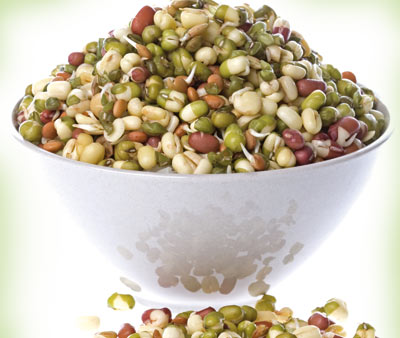 Foods like sprouts provide energy along with good nutrition. Each cup of raw sprouted moong contains about 150mg potassium, 15mg vitamin C [improves absorption of iron in the body and strengthens immunity], 8g proteins and ample amounts of fibre, calcium and zinc. Add sprouted beans in salads, sandwiches or stir-fried vegetables, and enjoy a fresh burst of energy without worrying about calories and portion sizes.
Foods like sprouts provide energy along with good nutrition. Each cup of raw sprouted moong contains about 150mg potassium, 15mg vitamin C [improves absorption of iron in the body and strengthens immunity], 8g proteins and ample amounts of fibre, calcium and zinc. Add sprouted beans in salads, sandwiches or stir-fried vegetables, and enjoy a fresh burst of energy without worrying about calories and portion sizes.
Berries
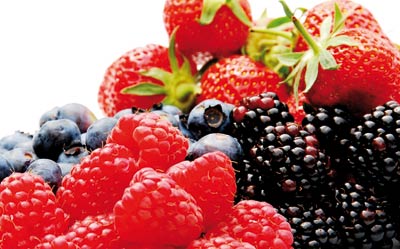 Being exceptionally rich in antioxidants, vitamins, minerals and dietary fibre, berries are a must in our top energy food list. Antioxidants are needed to neutralise the cell damaging effects of free radicals and improve metabolism. The phyto-chemicals present in berries help flush out stress induced toxins from the body, making you feel fresh and energetic. Whether you choose strawberries, raspberries, blueberries or Chinese berries like goji berry, they all help us to perform better for longer durations. They are excellent as mid-evening ‘pick me ups’ and low calorie dessert options.
Being exceptionally rich in antioxidants, vitamins, minerals and dietary fibre, berries are a must in our top energy food list. Antioxidants are needed to neutralise the cell damaging effects of free radicals and improve metabolism. The phyto-chemicals present in berries help flush out stress induced toxins from the body, making you feel fresh and energetic. Whether you choose strawberries, raspberries, blueberries or Chinese berries like goji berry, they all help us to perform better for longer durations. They are excellent as mid-evening ‘pick me ups’ and low calorie dessert options.
Vegetables
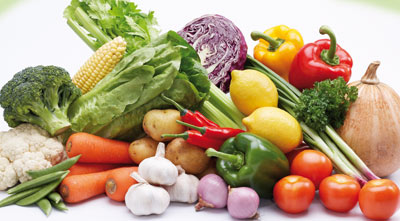 Potatoes, carrots, beetroots, spinach and broccoli stand out as energy enhancing vegetables. They supply a healthy dose of glucose, vitamins, iron, calcium, potassium and loads of fibre, enough to perk up a hectic day.
Potatoes, carrots, beetroots, spinach and broccoli stand out as energy enhancing vegetables. They supply a healthy dose of glucose, vitamins, iron, calcium, potassium and loads of fibre, enough to perk up a hectic day.
Wheatgrass
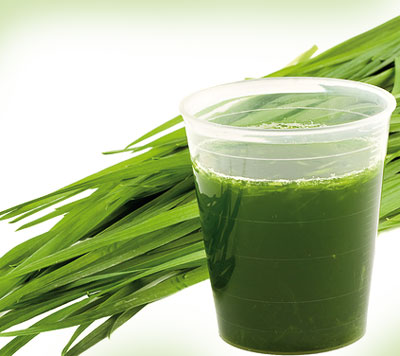 Jumpstart your lazy mornings with a glass of freshly prepared wheatgrass juice. Though quite easy to grow in home gardens, wheatgrass is also available in powder form, tablets or ready-to-drink juice containers. Considered to be bestowed with immense curative properties, wheatgrass works wonderfully as an energy booster, digestion aid and detoxifier. In addition to being rich in antioxidants, wheatgrass is a natural source of iron, calcium, B vitamins, magnesium and fibre.
Jumpstart your lazy mornings with a glass of freshly prepared wheatgrass juice. Though quite easy to grow in home gardens, wheatgrass is also available in powder form, tablets or ready-to-drink juice containers. Considered to be bestowed with immense curative properties, wheatgrass works wonderfully as an energy booster, digestion aid and detoxifier. In addition to being rich in antioxidants, wheatgrass is a natural source of iron, calcium, B vitamins, magnesium and fibre.
Sesame seeds
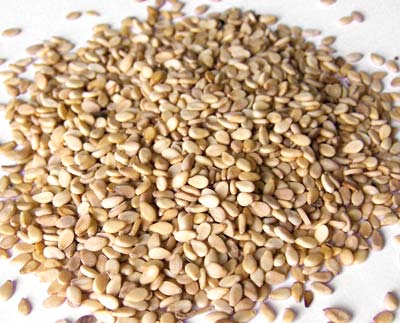 These tiny but mighty seeds can pack a nutritional punch with their wide array of energy promoting fatty acids, amino acids, and minerals. Sesame seeds are abundant in thiamine and magnesium, which are needed for production of energy from the foods we eat. Sprinkle white sesame seeds on salads or grab a til laddoo when the sweet craving strikes.
These tiny but mighty seeds can pack a nutritional punch with their wide array of energy promoting fatty acids, amino acids, and minerals. Sesame seeds are abundant in thiamine and magnesium, which are needed for production of energy from the foods we eat. Sprinkle white sesame seeds on salads or grab a til laddoo when the sweet craving strikes.
Eggs
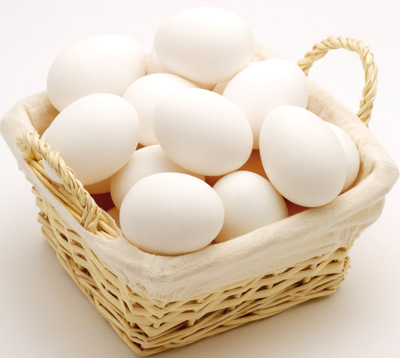 The amino acids in eggs provide a valuable and steady source of energy to the body without causing undesirable sugar spikes. The folates, B vitamins, iron and selenium present in eggs help maintain muscular strength, curb cravings and fight exhaustion. Eggs are often touted as a nutritional no-no, owing to the yolk’s cholesterol content. But they are in fact an inexpensive storehouse of nutrients which when included in our diets pack in power, strength and energy. Remember to keep the intake of saturated fats [meats and whole fat milk products] to minimum and you can enjoy three to four eggs in a week as a breakfast accompaniment or a high-protein lunch dish. Vegetarians can derive a similar nutritional profile from tofu and nuts.
The amino acids in eggs provide a valuable and steady source of energy to the body without causing undesirable sugar spikes. The folates, B vitamins, iron and selenium present in eggs help maintain muscular strength, curb cravings and fight exhaustion. Eggs are often touted as a nutritional no-no, owing to the yolk’s cholesterol content. But they are in fact an inexpensive storehouse of nutrients which when included in our diets pack in power, strength and energy. Remember to keep the intake of saturated fats [meats and whole fat milk products] to minimum and you can enjoy three to four eggs in a week as a breakfast accompaniment or a high-protein lunch dish. Vegetarians can derive a similar nutritional profile from tofu and nuts.
Dates and Jaggery
 It is quite evident that to go on a full throttle, our body needs foods that are high in carbohydrates, moderate in protein and low in fat. Dates and jaggery fit the bill quite well because of their high sugar density, zero cholesterol content and rich mineral profile, predominantly iron content. Keep them in your desk or kitchen cabinets along with almonds and raisins for those energy zapping sluggish phases of the day.
It is quite evident that to go on a full throttle, our body needs foods that are high in carbohydrates, moderate in protein and low in fat. Dates and jaggery fit the bill quite well because of their high sugar density, zero cholesterol content and rich mineral profile, predominantly iron content. Keep them in your desk or kitchen cabinets along with almonds and raisins for those energy zapping sluggish phases of the day.
What to eat when
Breakfast: Your first meal should be power packed and must include a good source of complex carbohydrate [oats, multi grain breads or cereals], and low fat protein [egg whites, skimmed milk or sprouted beans].
Add fresh fruits like berries, bananas or oranges to the fare and carry a handful of nuts to munch on as a midmorning snack. Eating refined carbs like white breads, cakes, cookies; fried foods, cups of coffee or worse, skipping breakfast would be a sure way to invite a mid-day energy crisis.
Lunch: Your goal should be to keep your ebbing energy levels as high as possible. Keep your meal low in fat [fat takes longer time to digest and tends to make us sleepy], and high in protein. Chapattis with paneer and vegetables or grilled fish with bread and salad are a few examples you could indulge in. Common energy zapping lunch traps would be rice with curries, pav bhaji, noodles and burgers.
Snack time: Grab a fruit or nibble on wheat crackers, khakhras or popcorn. Drink green tea, coconut water or buttermilk.
Dinner: Your choices depend on your post dinner activity schedule. While eating a comforting simple carbohydrate meal with lentils and veggies would help you relax after a gruelling day; having a combination of carbs, proteins and a dose of healthy fat for dinner will keep you active and alert till late. Yet again, overloading on low fibre and high fat foods is a complete no-no as it would only suck up your energy stores.
Rely on small and frequent meals over large meals to keep your energy meter ticking through the day. Skipping breakfast, having a hurried lunch at work and then a feast for dinner is the perfect recipe for an energy deficit disaster.
Dehydration is the biggest culprit when it comes to foggy thinking, worn out muscles and weary moods. So be sure to drink enough fluids through the day.
Finally, get adequate rest. Adopt relaxation techniques such as meditation, yoga, listening to music and follow a regular physical activity schedule [at least 30 – 40 minutes per day.
Eating the right combination of foods at appropriate times can not only act as energy boosters but also effectively prevent the onset of degenerative diseases. These eating strategies and foods will help you to maximise your performance and also to work smarter and for longer durations without fatigue.
Get the spring back in your step!

I so needed this article! From the past one week, my energy levels have gone completely down. I need to catch up on more sleep and incorporate this food in my routine to benefit. Sprouts are easy. I’ll get them today itself.